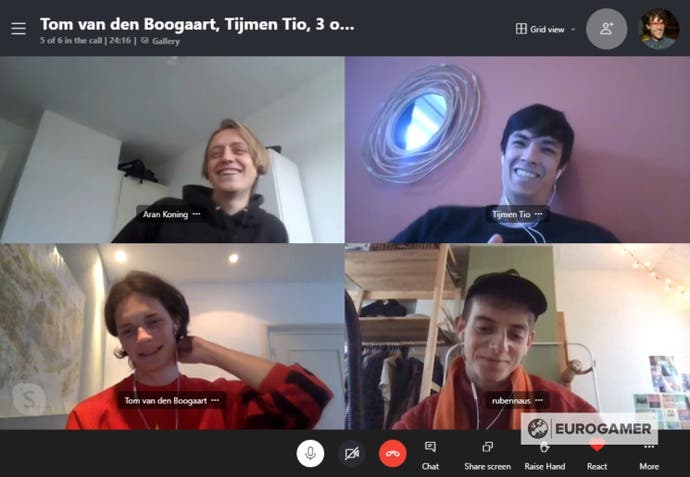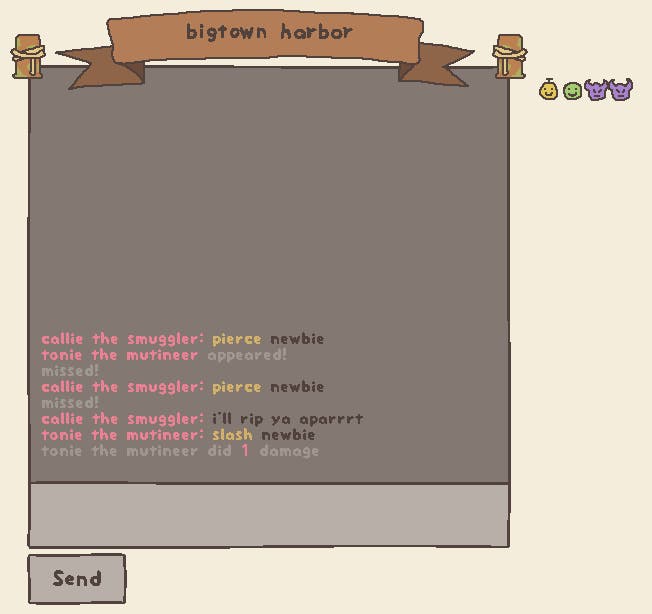The Sokpop Collective, an alternative vision of game development
They release a game every two weeks - but how?
Recently, I played a game called Pocket Watch. It's a game about being a duck on a tropical island and being trapped in a Groundhog Day-like, time-looping situation. It's super-cute, super-colourful, and actually, when you get into it, surprisingly deep and complex. And, hang on, it can't be - it was made in two weeks?!
That's what it looks like. Pocket Watch was made by a group called Sokpop, a young, trendy group turning out two new games a month. And this isn't some bold new idea Sokpop is intending to stick to: it has been doing it for three years already. There are 78 Sokpop games you can play. They're all bright, they're all colourful, they're all cheap (usually £3 each), and if they're half as good as Pocket Watch, probably well worth playing.
But how does Sokpop do it? How do you turn around a game like Pocket Watch in what appears to be two weeks? More to the point, why aren't more people doing it?
"There's a secret." I decided to go to the source itself and get all of Sokpop on a video call. This is Aran Koning talking, probably the most talkative of the bunch. "Do you know the secret?" he asks me, and no, Aran, I never do. "The secret is that we all make the games individually."
The penny drops. They're all smiling like I've missed something obvious, and probably I have. But they're charming smiles. They're charming guys. "For example," Koning goes on, "Pocket Watch was made entirely by Ruben [Naus]," who, on cue, smiles, "so we don't really work together on the games. Essentially, you have two months to make a game, and then we can offset the difference. So it sounds like we make a new game every two weeks, but there's a trick."
He grins again. "It's a simple trick Sokpop doesn't want you to know."

Sokpop are four friends living in Utrecht, the fourth-largest city in The Netherlands and a game development hotspot thanks to a very popular university course. The four friends are, in the clockwise order I see them (and you can too, in a picture in this article) Aran Koning (@arankoning), Tijmen Tio (@tijmentio), Tom van den Boogaart (@tomboogaart), and Ruben Naus (@rubna_). I thought they all lived in one big house together but they don't: Van den Boogaart and Naus share an apartment, the other two live nearby.
They've been banded together under the name Sokpop (inspired by playing Tony Hawk's Pro Skater) for around five years, but things really solidified - and turned up a gear - in 2018, when they took their idea to Patreon. The plan: promise two games a month for a monthly subscription of €3/£3/$3. They didn't expect a lot.
"We all made bets about how much money we were going to make," Ruben Naus says, prompting smiles as memories are jogged.
"I forgot about that!" says Tijmen Tio.
"Aran [Koning] said forty," continues Naus, "Tijmen [Tio] said fifty, and I had the most: I said eighty dollars. And at the end of the month, it was two-hundred or so-"
"It was five-hundred!" Tio butts in. "I'm pretty sure it was five-hundred."
"So we didn't expect it to go well at all," says Naus.
In fact, as Koning corrects, they had €523 by the end of January 2018, "which was a lot more than we expected to", and then it leapt to €1800 after a piece in the press that spring. They were chuffed, but it wasn't enough for the four of them to live on. Even at upwards of €4840 now, it's still not quite enough. But then along came Steam.
Steam made the difference. They uploaded their games in January 2020, and the impact was dramatic. "The games on Steam make more than we make on Itchi.io and Patreon together," Tio says. It shows what an unignorable powerhouse Steam remains in the PC space. "Only really last year, when we were doing it for two years, it was like, 'Okay, now we're making enough to live off of it completely," Koning adds.
Let's assume you're now sufficiently interested in Sokpop that you want to play one of the group's games. Where in the 78 games available do you begin?
"Err-"
"Ooh-"
"Jeez-"
"That's a hard one because we have so many games," says Koning
"We don't even remember all of them!" Tio adds, laughing.
"I wouldn't recommend playing them all," Koning says.
"No, don't do that," Naus agrees.
Unanimously, though, they recommend Chatventures, a game made by Tio. It's a text-based MMORPG - a multi-user dungeon (MUD) - an unusual kind of game for them, and they praise it for being very funny. But what strikes me is how they all selflessly rush to recommend else's game, rather than their own. It's nice.
After Chatventures, the recommendations slow down. Apparently it's hard because people want - and there is - such a variety of different things. Initially, Sokpop was known for goofy physics games like Ollie & Bollie and Pipo Park, which were made by Tom van den Boogaart.
But now, their biggest successes come from strategy, Simmiland in particular. It's a strange blend, a card-based god game, where you have 50 cards to play to set your civilization up for long-lived success. It's hard and most attempts end in failure, but each time you fail, you learn more about how the game, and how your funny little people, work. And egged on by your discoveries, you try again. I can't stop playing it, and clearly I'm not the only one. Simmiland is apparently "ten times" more popular than Sokpop's other games. It's even become a kind of scale to measure their other games' successes by. "This game is one-tenth of Simmiland," they say, according to Naus.
When a game breaks out like that, the effect is a boost for all of Sokpop's games, as newcomers look around for other things to play. Or, equally positively, the Patreon pledge increases. Such are the benefits of having a bulging back catalogue to play.

Sokpop manages all of this without management. They seem appalled at the suggestion there would be someone in charge. "Nooo!" they collectively blurt, and laugh. "A manager is who wears the most Sokpop gear at that moment," says Koning, flaunting his Sokpop jumper. Then, more seriously, he adds: "It's very flat. If we need to do something, we always just try to figure out who wants to do it, who's down for it? Otherwise we just try not to do it!"
"There's no leader or something," adds Naus.
"No, no hierarchy," Koning says.
It works because they are a close group of friends, who have known each other for several years, some of them since school. There's a visible ease about them, about how they bounce off of each other, and sit comfortably in each other's company, and they seem happy there.
If there is such a thing as a Sokpop style, it was never enforced. True, looks are important to them, so they put in a lot of time to make something appealing. But everything else came about as a byproduct of their friendship, of shared ideas, of revelling in the silliness of their games. They might develop individually, but of course they support each other, and they playtest, they advise. And if they see something they really like, they'll quite happily steal it to use themselves. Maybe that's where a kind of style emerged from.
What's so special about this whole enterprise is freedom. Unlike so many others, they are not bound to any one project - or to a specific part of any one project - for many years. "You can make whatever you want," says Koning, "and you don't have that opportunity when you try to make one big commercial game. There's no way you can just make a silly, small thing and then expect to sort of make a living out of that."
They are free to work when they want, and they are free to experiment and try new things. People literally pay them to do that, remember. They're not paying for sequels: they're paying for two Sokpop games a month, whatever they are. And if some of them don't work out, it doesn't matter. "Just tie a knot in it and ship it," says Tio. Relax, move on. It doesn't matter. It's only two months of time. The only pressure they really have is to their patrons, who are, by all accounts, "super-chill", and don't mind a slip here and there.
That's not to say any of this is easy. Making a game every two months "stays hard", no matter how many games they've got under their belts, says Naus. And making so many games brings with it the creeping worry that creativity will dry up. "We used to say no," says Naus, "but now..." He leaves the uncertainty hanging in the air.
But it's not there long. "I think it feels like [you're running out of ideas]," Tom van den Boogaart says. "Often, when I don't have an idea for a new game, it somehow just comes when I really need to make it. So it feels like I'm out of ideas but maybe I'm just not thinking hard enough."
This strikes a chord with the rest of them. "Yeah, once you concentrate, they usually come," says Naus. "It's not really a matter of inspiration, but of concentration."
"Yeah, you've just got to think about it," adds Koning.
"It's like magic," remarks Tio. "You don't know how to do magic: it'll just come to you."
There's a pause while this sinks in. Everyone looks a bit confused. What did he just say? And then, like on so many other occasions during this call, there's laughter. "Only in the most dire situations!" Tio quickly clarifies. "Like when you have to make a game in two weeks."
This time constraint is a powerful factor in Sokpop's success. Before Patreon, they all struggled to release their games, and their followers teased them about it. But with Patreon pledges came responsibility and the tables turned. "It's revenge!" says Tio. "People always told us, 'You never finish your stuff!' And now we bombard them with a hundred games."
Having only two months to make a game also means they cannot be precious about their ideas. They simply don't have time to chase a dream, and that, as strange as it sounds, can be an enormously liberating thing. Think how many developers lose themselves in over-ambitious ideas.
"I used to always have these dream projects," says Naus, "and those are like, that's not a good relationship to have with what you're making. Because then it's like your vision will be very fake. And it's better to have this open mindset, like, 'Okay I'm here now, what can I do to make this interesting?' And not cling too much to your initial idea."
The time constraint is a blessing and a curse, adds Koning. It can hold you back from further pursuing an idea you really like, but at the same time, it can save you from pursuing an idea you don't. "If you're sort of stuck, then it's nice to have that option," he says. "Like, 'Oh it can just be a small thing.' And it will still be a complete game, and it will still be fun."
"Yeah," agrees van den Boogaart, "and [it helps] not overthink decisions."
"It's also a nice excuse to say, like, 'Well, it isn't perfect but it was made under these time constraints so couldn't do any better," says Naus. How many other developers would love to be able to say that?
Nevertheless, changes are coming to this golden two-game-a-month idea. Just this month, Sokpop polled its Patreon subscribers to ask how they'd feel if the team moved to releasing one game a month instead of two. "We were kind of done with the [smaller] scope," says Naus. "We wanted to go a bit bigger."
The answer was, unanimously, yes: go for it.
"We still need to do the official announcement but we're going to make the change," confirms Koning. "Mostly because we then have a bit more time for everything around the games. We want to focus a bit more on YouTube content. We used to always do introduction videos, where we would explain the game, but we would also like to do stuff where we go a bit more in depth about the game, maybe a stream or something like that, because that's also what people are interested in, we found."
"Most people on the Patreon follow us more than the games," Naus adds, echoing something I've heard friends with Patreon projects say. And seeing the four of them together on screen, it's not hard to appreciate why. They are young, handsome, and charismatic. It pains me to say it but a kind of boy band of indie game development, paradoxical as that may sound.
But there's trepidation too. With only one game a month, there will be more pressure on each game to perform. There will be more hype. Perhaps this will upset their golden formula. "That's what I'm worried about with the new model of one game a month," admits Naus, "that the anticipation will be higher."
"Yeah," van den Boogaart agrees.
"That's a big thing I'm really worried about," continues Naus.
"But then there's still one in a month," Koning says.
"That's true," Naus replies, but I'm not sure he's convinced.
And so a new chapter for Sokpop begins. Perhaps more time to make each game will fuel more breakout successes, and perhaps Sokpop will rise to new heights. Perhaps with it, a few cracks will start to appear. But I hope not, because what I see remains a shining example of sustainable, creatively freeing, non-toxic game development. And it's something I'd like to see a lot more.



